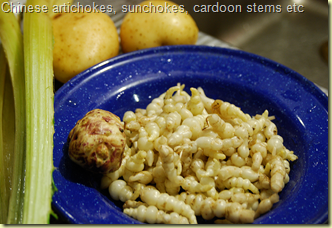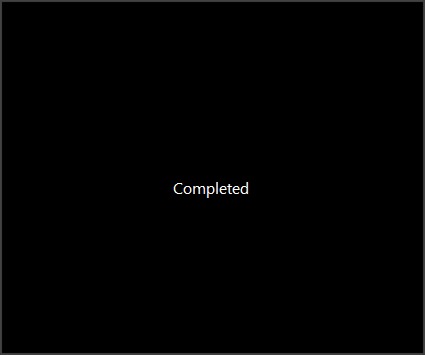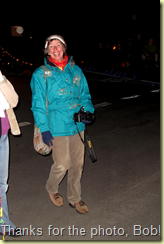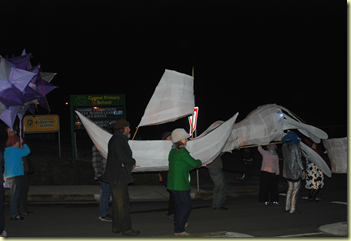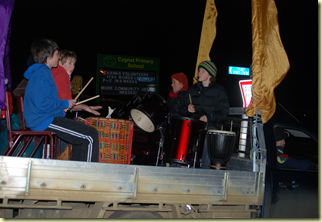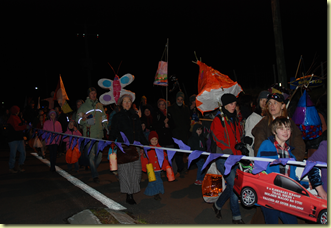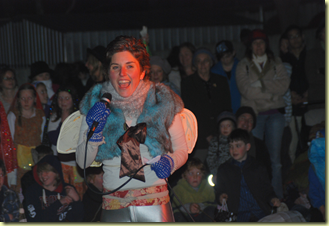Tuesday, July 31, 2012
Cast your vote, every time you eat....
70% of the world's population is NOT fed by multinational, chemical agriculture; it is fed by people growing their own food. Small scale, traditional, ecological farming systems use less land, less water and fewer resources. They grow healthy, nutritious food and nurture greater crop diversity. They are more resilient, in our changing climate. They feed people direct from land to mouth; saving seeds for next year.
We all eat. We who read this blog all have the power to choose the origin of our food. Grow and buy local, organic, seasonal food. Support farmers' markets and independent shops. Join forces and share with friends and neighbours. You cast your vote every single time you shop, in fact, every time you eat. Take control of the future of food.
Tuesday, July 24, 2012
Taste, Memory…. a personal look at food biodiversity
David is an amazing bloke who I met through Kitchen Gardeners International, on my Voyage of the Vegetable Vagabond in 2008. He works tirelessly and enthusiastically in growing incredible food and educating people about the why, what and how. He lives in Maine, USA. I will be buying this book and relishing every morsel of it.
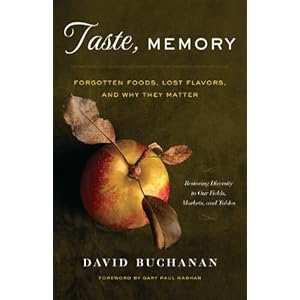
Publication Date: October 25, 2012
Taste, Memory traces the experiences of a modern-day explorer, one who doesn't discover new lands and new cultures, but who rediscovers our common food heritage and then works to bring it back to our gardens and tables for all to appreciate and enjoy.
From a cantankerous old pear tree to a strawberry that's too delicate to ship to distant markets, David Buchanan has grown out and evaluated thousands of varieties of fruits, grains, herbs, flowers, and vegetables, capturing not only their flavors, but their fascinating stories and their place in the local harvest.
What we grow is just as important as where we grow it, and a resilient food system depends on the ongoing search for regionally adapted varieties. Local food at its best differs in both kind and quality from commodity crops that are shipped around the globe. If everyone were to grow the same apples or tomatoes, for example, then we would miss out on the full palate of tastes available to us, as well as the sense that local food can reflect a particular people, place, and culture.
Profiling his own efforts as a young garden-farmer who is still finding his own place in the world (using leased gardens and orchard space), Buchanan also writes about some of the most important people who are working to defend and promote biodiversity and meaning in our food system. From gardeners and cooks to environmentalists and food activists - all of these people are preserving the best of our traditional foods and ensuring that they will be around for future generations to enjoy.
Taste, Memory takes readers on a beautifully written personal journey into what food diversity really means, and why it matters now more than ever.
Editorial Reviews
"Taste, Memory may well be the most beautiful book ever written about food biodiversity and how it has 'landed' on earth, in our mouths and in our hearts. Once you have read and digested David's book, you will never again regard this two-word phrase as an abstraction, but as a vital element of our common food heritage, one that continues to nourish and enrich our lives."--from the foreword by Gary Paul Nabhan
About the Author
David Buchanan planted his first gardens in central Washington State more than 20 years ago, after learning about the heritage food movement through the Seed Savers Exchange. He has worked for farms, ranches, and nurseries; operated a landscape design company specializing in native plant restoration; managed an educational farm for a community non-profit; and helped found the Portland, Maine, chapter of Slow Food USA.
In the mid-1990s he worked for Arche Noah, an Austrian seed-saving organization, producing seeds to maintain the thousands of varieties of vegetables and grains in their collection.
David helped found and for three years led the Portland, Maine, chapter of Slow Food. He now serves on its national Biodiversity Committee, which evaluates and helps preserve endangered heritage foods from around the country.
In 2008 he managed Turkey Hill Farm in Cape Elizabeth, Maine, and continues to maintain gardens there and at two nearby sites. Currently he oversees vegetable and cut flower production for Old Ocean House Farms in Cape Elizabeth, and grows more than 250 varieties of fruit, as well as herbs and heirloom vegetables. He sells nursery plants, organic vegetables, fruit smoothies, and raw cider at the Portland farmers market.
He is a board member of Kitchen Gardeners International.
Thursday, July 19, 2012
Excited by something green
I knew I was a bit more passionate about growing vegetables than some, or even most, people but I did not realise that the reason may well be that a lot of people just are not very excited about vegetables, full stop.
I spent the morning gardening in a lush and productive vegetable garden belonging to one of our Wednesday gardening group. One of the jobs was to remove an enormous, but evidently not very good, artichoke. Chatting to one of the others, we thought that this might have been a cardoon, so long and thick were its leaf stalks and this would account for its earlier crop of small but plentiful “artichokes”.
After a good time digging all the way to China to get to the bottom of its root system, we divided it up and I removed most of the lush growth, so that the offshoots could be given away, if anyone wanted them. I stood there on that hillside, looking down at the patchwork of farms in the picturesque valley below, my thoughts constantly interrupted by a cow insisting on attention on the other side of the veg garden fence. The wind was cold but I was in the lea of a wall and the sun was warm. Life sometimes is amazingly good.
I stripped off the celery-like strings of one of the “artichoke” leaf stalks and bit into it to see if it was edible. Wow, I thought, this is crisp, incredibly juicy and very edible; a great celery substitute for winter. I called over Frances for a bite and she agreed, very edible and nice. So I gathered some of the juiciest looking leaf stalks for everyone to take home and eat and prepared one for them all to try while we had morning tea a bit later.
When the coffee gong sounded I took our discovery and sliced it up like celery, put it all into a bowl and offered it around….. silence…. “it tastes like nothing”…..”not very interesting is it”….and then..… “oh greens…. yeah I must try to get to like them.”
What!? I am still so stunned I cannot think what to write. Here was a discovery for adding a juicy crunch to winter salads the length and breadth of the Huon Valley and only Sandra was at all interested. Greens…. well, what do you eat if you don’t eat greens? There’s a limit to the number of potatoes and carrots I can eat…. my meals are full of greens from my garden of every sort, from Asia to America and European cultures. My life would be empty without greens and arms full of herbs, in soups, salads, casseroles and served with or for every meal.
The penny dropped…. is this why people are not passionate about growing food like I am? Is this why only Frances and I wanted to work in the vegetable garden while everyone else chose other jobs? Do I need to change my approach and, instead of offering to show people how to grow vegetables, I first need to show them how to eat them?
It has been in my mind for a year or so….a new workshop in my kitchen….
”Cook with me from My Garden”
Every week (summer) or maybe month (winter, when things grow so slowly) a small group of people would come and gather food from my garden and together we would make it into a deliciously simple but tasty and healthy meal in my kitchen, and then eat together. I would help people shop from their gardens; seeing their gardens (or even the new local, seasonal greengrocer “The Cygnet Garden Larder”) as their primary source of food. I would show them my cookbooks, arranged by season or alphabetically by ingredient and how invaluable it is to be able to get ideas for cooking with whatever is available.
Below left…. preparing Belgian Endive clusters for over-wintering in the dark. 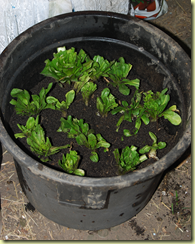
Below right….winter salad from my garden…irresistible, I think!
I have to be prepared for resistance….. I have to encourage and educate sweetly (oh dear)….
I am determined to offer wellness, vitality and an uplifted spirit…
Of all the things I do with gusto and success, this is the one I have the most passion for and the one I am most nervous about, at the same time.
Life is good….. but a whole lot better with home grown greens and herbs everyday.
Friday, July 13, 2012
Rhubarb Cottage….
I ate my dinner in front of the TV, watching Hugh Impossibly-Long-Name at River Cottage. I wasn’t really concentrating until after he had baked some rhubarb, which was just about at the same time as I finished my dinner…. and I thought “Hmmmm…. dessert would be nice…. how did Hugh do that rhubarb thing?”
I have one of those fancy machines that lets you rewind live TV…. so rewind I did…. and saw him throw a whole pile of chopped rhubarb in a baking dish, drizzle it with quite a bit of honey and stick it into the oven for 20 minutes or so.
I hesitated… its dark, you see…. and I’d have to pick rhubarb by torch light. Well, the gist of it is that I did it and discovered the rhubarb had grown amazingly long stems since I last looked at it, which was very good timing. All excited, I picked way more than I meant to!
Inside, I washed and chopped it and tossed it in the baking dish….and I’d cleverly put the oven on before I went outside. I have one pot left of my favourite honey, orange blossom. It had gone a bit hard so I scooped out a big spoonful, put it into a glass jug and heated it so I could drizzle, like Hugh did. And that is all I did. Into the oven it went, for 20 minutes.
If it was ordinary, I would not be sitting here writing this! I would be watching Maeve’s French Food Safari, which my TiVo has agreed to pause for me, while I tell you that this was the best rhubarb thing I have ever eaten….and simply served piping hot, with icecream.
I ate half; more rhubarb than anyone needs to eat but….. I might just have a tiny skerrick more, with a teensy weensy little dollop of ice cream….. or maybe I will leave it for breakfast!
Don’t be shy with the honey; it can take a lot. This is not the mushy rhubarb you get when you cook it in a saucepan; this is texture and full flavour. Be careful not to overcook it or it may ruin your baking dish when the honey burns.
Wednesday, July 11, 2012
Organic Pest Control
I woke up early and sat in bed reading. Then I began to feel a bit annoyed, then sick and then very irate. I have the latest Green Harvest catalogue. Although it comes from Queensland, from time to time I have ordered their bulk seeds, for sprouting and for growing microgreens, since these are less climate dependant than growing in the garden. This morning I had made it to the last 10 pages, a full 1/4 of the catalogue, called Organic Pest Management.
Please tell me why all the focus is on killing things….. and why people need to be controlling pests, in an organic garden. I will tell you why; its all about making money and it makes me sick. Bottles and packets of stuff to spray all over your garden is not organic…. And please tell me what is organic about the plastic bottles these products are packaged in. It a similar lack of integrity in shops calling a vegetable grown organically in Peru and then transported to Australia, organic!
The Green Harvest products are infuriating! For example:Yellow Sticky Roll Trap….to mass trap flying insects. What!! That is madness!! And Trappit Barrier Glue…to prevent insects from climbing into the tree. Oh, this is like the stupidity of using a disinfectant (even organic eucalyptus oil) on your kitchen benches, killing all the bacteria; as if all insects and all bacteria should be eliminated from the earth….
….In his book The Diversity of Life, renowned entomologist Edward O. Wilson discusses the importance of insects and land-dwelling arthropods in the ecosystem, saying that "if [they] all were to disappear, humanity probably could not last more than a few months." Most other life forms, like amphibians, reptiles, birds, and mammals would also become extinct because of the domino effect that would occur in the food chain.
Insects perform a vast number of important functions in our ecosystem. They aerate the soil, pollinate blossoms, and control insect and plant pests; they also decompose dead materials, thereby reintroducing nutrients into the soil. Burrowing bugs such as ants and beetles dig tunnels that provide channels for water, benefiting plants. Bees play a major role in pollinating fruit trees and flower blossoms. Gardeners love the big-eyed bug and praying mantis because they control the size of certain insect populations, such as aphids and caterpillars, which feed on new plant growth. Finally, all insects fertilize the soil with the nutrients from their droppings
Many insects are herbivores, or plant-eaters, which makes them primary consumers. This abundance of primary consumers provides protein and energy for secondary consumers, known as carnivores. There are many secondary consumers, such as spiders, snakes, and toads that could not survive without feeding on insects. Tertiary consumers eat other carnivores; for example, bears and chimpanzees eat insects as well as other animals….
There is one very simple answer to reducing the amount of damage to food grown in your garden. Biodiversity. Look at nature and do your best to copy it. Are insect controls needed in the rain forests of Tasmania…. or the outback of S.A.…. or the tropical rain forests of Qld? Nope. They are full of biodiversity, providing habitat for an ecosystem full to overflowing with insects, who, along with a myriad of birds and other wildlife, all keep each other in balance.
Stop trying to control the life in your garden. Instead, encourage it and it will reward you with beauty, food and time to relax. Make your food garden a wonderland of diversity; a place where you can sit, watch and hear nature and know that you are providing for, not killing, life on earth.
Monday, July 2, 2012
The Cygnet Lantern Parade
Cygnet is a tiny place, population wise, with the township sign announcing the population as 800. And yet, it seems much bigger; kind of like a little dog with a big heart. Have a look at this night shot of the Solstice Lantern Parade….. mid-winter, everyone rugged up and more people than I have ever seen in Loongana park,Cygnet, before….
Thanks to Steve for the photo, via the Huon Crier.
People went to a lot of trouble making lanterns for the parade, with the waterways theme of boats and sea creatures most prominent…. I was just decked out in a string of solar powered butterflies, which sadly do not show up in this photo…
Once the parade reached the park, everyone descended on the lantern-lit soup and bread stall which gave out free sustenance to the enormous crowd before the shadow-puppet show began. This year the story was a local Aboriginal one of whales and eagles and sharks and how the coastline got its myriad of bays from the swishing of the whale’s tail. Apologies for my shocking photography!
Theresa did a fabulous job as the compare fairy, keeping everyone entertained between the acts. The wonderful evening ended with a bonfire and music.
Thanks must go, once again, to the Cygnet Arts Council who always do everything so well. But special congratulations should go to the people of Cygnet and beyond, who bothered to make lanterns and join in the mid-winter festivities.
